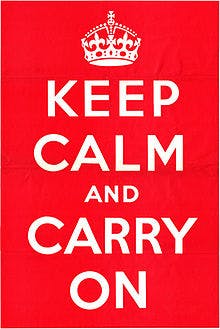Back in the days when I made my living as an editor, I used to go to a good number of conventions.
One afternoon, while on the phone with an author (let’s call her Jane), the conversation veered to one of these upcoming meetings.
Without warning, Jane said, “I guess Pierre [my boss at the time—not his real name], will be dragging out that ratty black jacket he always wears. God that thing is awful. I wonder where he got it? He’s the worst dresser I’ve ever met.” Then she was silent.
And I was dumbstruck.
An important work lesson
I didn’t know what to say. Should I disagree and defend my boss? (“I don’t think the jacket’s that bad, Jane. Plus, it’s not nice to gossip.”)
Or should I agree with her? (“Oh boy, you hit the nail on the head with that one, Jane! And he’s French, too? I thought good taste in clothing was de rigueur.” Tee hee.)
Either way, this was an important client relationship, I liked my boss and I didn’t want to get into it.
And then it hit me: I didn’t have to say a word.
I paused. I said how lovely it was to catch up, Jane agreed, we said our goodbyes, and I got the hell off the phone.
Important work lesson #357 — Just because someone says something to you doesn’t mean you have to react.
Learning it a second time
Cue to several years later.
I’m in HR management, and I’m about to learn Lesson #357 all over again when one of the bully managers in my company decides she doesn’t like the fact that I’ve insisted an entry-level support position be classified as non-exempt. (I’m serious, people.)
Instead of confronting me to my face, however, said manager sent me a string of nasty email messages littered with her strong opinion of my incompetence along with one or two legitimate questions sprinkled here and there just to keep things “professional.”
I ignored everything but the legitimate questions, which I briefly answered.
And when the manager kept at me, I stopped responding, period. After all, I’d already answered her real questions.
Was I angry? Oh heck yes. Was I frustrated, disgusted, and exasperated? Uh huh. Was I tempted to defend my capabilities and my decision? You betcha.
But guess what? Restraining myself felt good.
Each and every action deserves a reaction – not!
Now, I could be wrong, but I think there are a lot of employees like the me I used to be—employees who’ve come to believe that each and every action deserves a reaction.
But to quote Tim Sackett, that’s bullshit.
When something truly offensive comes out of your mouth or drops into my inbox from your computer, I may or may not choose to respond, but I don’t owe you a reaction. Take your foolishness somewhere else.
In fact, if I’m truly wise, I’ll learn the difference between reaction and response, and I’ll put my knowledge into action every day, which includes practicing the art of :
- Calmly stating a position and moving on.
- Disengaging (rather than taking stuff personally).
- Overlooking. (Otherwise known as, “I’m going to pretend you did not just say something so dumb/offensive/evil, because you’re not rattling my cage today.”)
- Refusing to be put on the spot. (Nope, not taking the bait.)
- Enforcing boundaries.
“Keep Calm and Carry On”
These are all ways to manage your reaction when the only good reaction is no reaction.
From tyrant managers to manipulative co-workers, the workplace is full of people looking to get a reaction.
Don’t give them the satisfaction.
What is it the Brits say? “Keep Calm and Carry On.”
That sounds about right.
